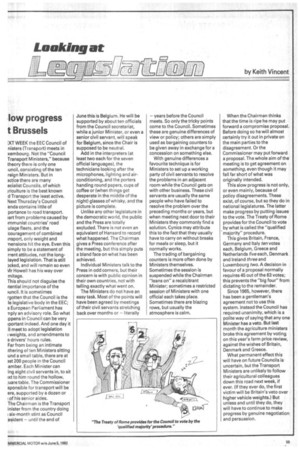'low progress t Brussels
Page 57

If you've noticed an error in this article please click here to report it so we can fix it.
:XT WEEK the EEC Council of nisters (Transport) meets in xembourg. Not the "Council Transport Ministers," because theory there is only one luncil, consisting of the ten reign Ministers. But in actice there are many ecialist Councils, of which Iriculture is the best known
d Transport the least active. Next Thursday's Council enda contains little of portance to road transport. )art from problems caused by imrnunist countries' road ulage fleets, and the couragement of combined insport, only weight and -nensions hit the eye. Even this simply to be a statement of rrent attitudes, not the longlayed legislation. That is still Dcked, and will remain so even lir Howell has his way over mitage.
This should not disguise the otential importance of the )uncil. It is sometimes rgotten that the Council is the le legislative body in the EEC; European Parliament has riply an advisory role. So what ippens in Council can be very iportant indeed. And one day it ill meet to adopt legislation weights, and amendments to e drivers' hours rules.
Far from being an intimate ithering of ten Ministers sitting und a small table, there are at ast 200 people in the Council lamber. Each Minister can ing eight civil servants in, to sit ixt to him round the hollow, pare table. The Commissioner sponsible for transport will be ere, supported by a dozen or of his senior aides.
The Chairman is the Transport mister from the country doing ; six-month stint as Council esident — until the end of June this is Belgium. He will be supported by about ten officials from the Council secretariat, while a junior Minister, or even a senior civil servant, will speak for Belgium, since the Chair is supposed to be neutral.
Add in the interpreters (at least two each for the seven official languages), the technicians looking after the microphones, lighting and airconditioning, and the porters handing round papers, cups of coffee or (when things get desperate in the middle of the night) glasses of whisky, and the picture is complete.
Unlike any other legislature in the democratic world, the public and the Press are totally excluded. There is not even an equivalent of Hansard to record what happened. The Chairman gives a Press conference after the meeting, but this simply puts a bland face on what has been achieved.
Individual Ministers talk to the Press in odd corners, but their concern is with public opinion in their own countries, not with telling exactly what went on.
The Ministers do not have an easy task. Most of the points will have been agreed by meetings of their civil servants stretching back over months or — literally — years before the Council meets. So only the tricky points come to the Council. Sometimes these are genuine differences of view or policy; others are simply used as bargaining counters to be given away in exchange fore concession on something else.
With genuine differences a favourite technique is for Ministers to set up a working party of civil servants to resolve the problems in an adjacent room while the Council gets on with other business. These civil servants are usually the same people who have failed to resolve the problem over the preceding months or years, but when meeting next door to their Ministers they commonly find a solution. Cynics may attribute this to the fact that they usually have to carry on without breaks for meals or sleep, but it normally works.
The trading of bargaining counters is more often done by Ministers themselves. Sometimes the session is suspended while the Chairman "leans on" a recalcitrant Minister; sometimes a restricted session of Ministers with one official each takes place. Sometimes there are blazing rows, but usually the atmosphere is calm. When the Chairman thinks that the time is ripe he may put forward a compromise proposal. Before doing so he will almost certainly try it out in private on the main parties to the disagreement. Or the Commissioner may put forward a proposal. The whole aim of the meeting is to get agreement on something, even though it may fall far short of what was originally intended.
This slow progress is not only, or even mainly, because of policy disagreements. These exist, of course, but so they do in national legislatures. The latter make progress by putting issues to the vote. The Treaty of Rome provides for the Council to vote by what is called the "qualified majority" procedure.
This gives Britain, France, Germany and Italy ten votes each, Belgium, Greece and Netherlands five each, Denmark and Ireland three and Luxembourg two. A decision in favour of a proposal normally requires 45 out of the 63 votes; this prevents the "big four" from dictating to the remainder.
Since 1965, however, there has been a gentleman's agreement not to use this system. Instead the Council has required unanimity, which is a polite way of saying that any one Minister has a veto. But last month the agriculture ministers broke this agreement by voting on this year's farm price review, against the wishes of Britain, Denmark and Greece. '
What permanent effect this will have on future Councils is uncertain, but the Transport Ministers are unlikely to follow their agricultural colleagues down this road next week, if ever. (If they ever do, the first victim will be Britain's veto over higher vehicle weights.} But unless and until they do, they will have to continue to make progress by genuine negotiation and persuasion.


























































